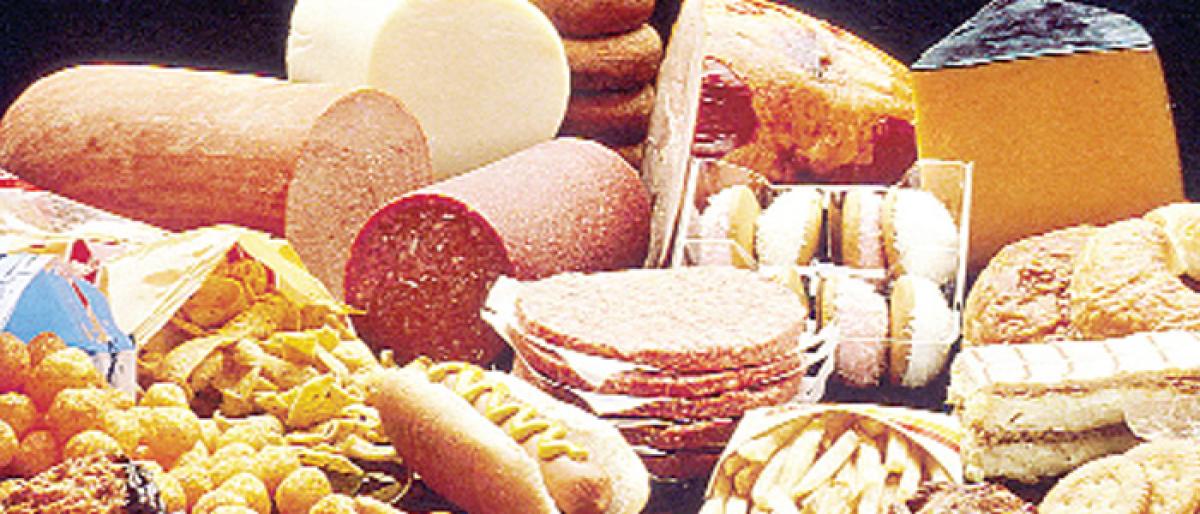Live
- BJP urges EC to stop Cong’s ‘Guarantee Cards’ campaign aimed to 'induce voters'
- Congress cheated Madigas: Dr. RS Praveen Kumar
- CBDT signs record 125 pacts to ease tax payments by big multinational firms
- Kamal Nath accuses BJP of ‘threatening’ Congress leaders in Chhindwara
- Odisha: BJP, BJD allege violation of MCC
- PM Modi lands in Guwahati to kickstart poll campaign
- ‘100 day action plan’ is PM Modi’s signature style for setting goals and meeting targets
- BJP will change the Constitution if they come to power again, says Priyanka Gandhi
- BJP-led NDA to cross 390-mark in Lok Sabha polls, predicts India TV-CNX survey
- Haier launches new TV series in four sizes in India
Just In

Despite being part of the holy trinity of macronutrients, for the longest time, fats bore the brunt of dietary misconceptions. As a process of being made a scapegoat for ballooning waistlines and failing health, large segments of the population switched to low-fat foods.
Despite being part of the holy trinity of macronutrients, for the longest time, fats bore the brunt of dietary misconceptions. As a process of being made a scapegoat for ballooning waistlines and failing health, large segments of the population switched to low-fat foods.
But the shift didn't lead to healthier people; instead, this shift proved counterproductive, and banishing fat from our dietary intake didn’t lead to a rise in overall health either since people consumed more food in order to reach their satiety levels.
The first thing to remember is that fat is one of the three major macronutrients needed by the body, besides carbohydrate and protein, and deserves to be discussed with the same rationality and patience that we dedicate to the two. It is a major source of energy, and it helps absorb oil-soluble vitamins. Fats are necessary for proper growth, development, and maintenance of good health.
The biggest reason for the confusion and misconceptions surrounding fat in the public domain is that enough discussions haven’t been held around different types of fats, like unsaturated fats, saturated fats, and trans-fat. When it comes to a bad reputation, unlike other forms of fat, trans-fat has definitely earned it.
Trans-fats are a type of fat which are formed during the process of hydrogenation i.e. they are formed artificially when unsaturated fats undergo a process of hydrogenation. During this process, some part of the liquid oil is converted to trans-fat, which remains solid even at room temperature.
They also occur in small amounts in nature. Small quantities of trans-fats are naturally present in certain meat and dairy products, including butterfat. In earlier days several restaurants and fast-food joints used hydrogenated oils or Vanaspati which contain a good amount of trans-fats to deep fry foods.
Trans-fats, however, do come with their caveats, as excess consumption of trans-fats has been shown to increase the risk of coronary heart disease by increasing the cholesterol particularly LDL (known as bad cholesterol) and decreasing levels of HDL (known as good cholesterol). High intake of trans-fats has also shown to increase triglyceride levels in the blood, promote inflammation and thus increasing the risk of cardiovascular diseases.
In the 1990s, research began identifying the adverse health effects of trans-fats, which are present in hydrogenated fats like Vanaspati, margarine and shortenings. These fats are commonly used to make pastries, pie crusts, biscuits, pizza dough, cookies, crackers as well as fried foods like French fries, doughnuts, etc. Speaking specifically from an Indian perspective, we definitely have many reasons for concern when it comes to trans-fat and how they can have a debilitating effect on our population.
A large part of the country doesn’t have access to expertise in nutrition, and accessibility to quality healthcare still remains a pan-India challenge. The need to spread awareness about trans-fat is exacerbated all the more because of changing food habits, especially in urban India.
Obesity is a health epidemic in urban India, and health experts have been working round the clock to educate the public on various fats and the need for their inclusion or exclusion from our diets.
If you need an alternative to these forms of food, especially for cooking, switch to healthy vegetable oils which tend to decrease the risk of heart diseases. Consumers should also seek trans-fats free products since they are comparatively healthy.
Globally there has been a trend to produce trans-free/ low trans containing food products. Across the world, countries like Denmark, Australia, Belgium, Canada, Israel, etc have already looked at various food policies or public health circulars that focus on trans-fat, in some cases strictly imposing limits on the content of trans-fat in their food products.
In India, The Food Safety Standards Act of India (FSSAI) has put a limit of five per cent maximum for trans fats in Vanaspati, Bakery Shortening and Margarine. It is now mandatory to declare the content of trans-fats and saturated fats on the labels of packaged foods along with other nutritional information.
Hence, keeping our health in mind, we must keep a check on what we consume. When in a supermarket, one must always read the label and check its contents, in order to figure out whether the particular product is healthy or not.
Oils and fats manufacturing companies are now gearing up to market low trans or trans free products. Nowadays, many fast food manufacturers have undertaken extensive developmental efforts to reduce or even eliminate trans-fats in foods.
To lead a healthy and fulfilling life it is best to cut down the trans-fat intake, switch to healthier options, have a balanced diet and supplement it with regular fitness exercises. A healthy diet sans trans, along with regular exercise and maintaining desired body weight helps in stress management thus further helping in combating other lifestyle diseases.
By: Arun Varma
The writer Vice-President, Sales and Marketing, Food Service Division, AAK Kamani Private Limited.

© 2024 Hyderabad Media House Limited/The Hans India. All rights reserved. Powered by hocalwire.com







